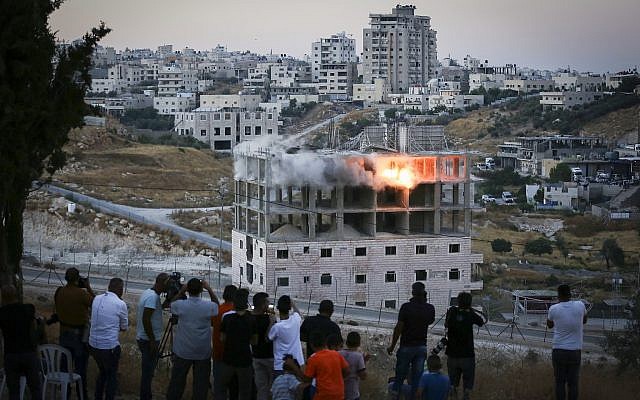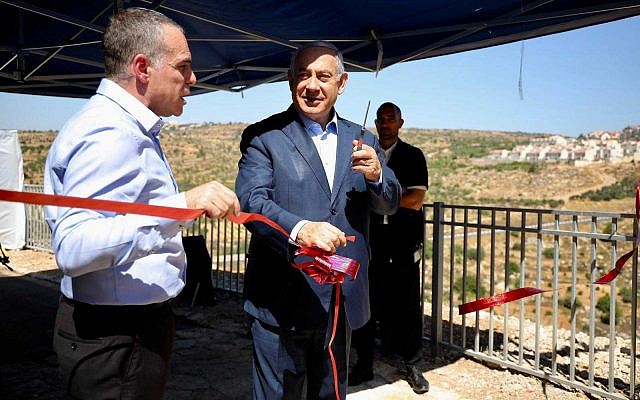T. Belman. This is very confusing. Why does Israel have an obligation to issue permits in Area C for Palestinians. Are these permits for any Palestinian or for those living in Area C? Why is Bibi and the right so passive in response to the illegal building? Why did Smoltrich agree to the issue of these permits.
Former Defense Ministry settlements adviser says cabinet approval of 700 homes for Palestinians a positive carrot, must be followed by stick of enforcement against illegal building
Two months out of his post as Defense Ministry adviser on settlement affairs, Kobi Eliraz is sounding an alarm over what he claims is Israel’s failure to exercise its authority in the strategic parts of the West Bank that it controls.
In an interview with The Times of Israel, Eliraz lamented the pace at which illegal Palestinian construction has ballooned over the past decade without any enforcement by state authorities in Area C — the 60 percent of the West Bank over which Israel was granted full military and administrative control under the 1994 Oslo Accords.
Citing Defense Ministry statistics, Eliraz said Wednesday that compared to Israeli settlers who number roughly 450,000 but take up roughly 9% of Area C, the 200,000 Palestinians there have managed to gain control of 30% of the land, with much of it being used for agricultural and grazing purposes.
However, he acknowledged that Israel’s almost complete failure to grant Area C Palestinians permits to build over the past three decades has led to a situation in which “since everything is prohibited, everything [de facto] becomes allowed.”

Eliraz held the settlements docket for four years in the Defense Ministry, appointed in 2015 by Moshe Ya’alon and then staying on when the Blue and White MK formerly on the Likud party was succeeded by Yisrael Beytenu head Avigdor Liberman, followed last year by Prime Minister Benjamin Netanyahu himself.
Eliraz, who had previously served as the chairman of the Eli settlement’s secretariat and as an official in the Housing Ministry, became well regarded in government and settler circles for his professionalism and knowledge of the issues.
But early in June he received an abrupt call from a staffer in the Prime Minister’s Office, ordering him to turn in his ministry vehicle and cellphone the next day as he had been fired.
Eliraz insists that he still does not know the reason for his axing. But one settler leader who spoke on condition of anonymity said that Netanyahu wanted to replace the veteran aide with a confidant from his Likud party, as opposed to Eliraz, who had served under two of the premier’s rivals.

While he had maintained a low profile at the Defense Ministry, rarely granting interviews, Eliraz has begun speaking out publicly over the past two months against a trend he is certain will leave Israel without enough land in the West Bank to annex if and when it chooses to do so.
The Oslo division of the West Bank was intended to be temporary and many expected Israel would return the vast majority of Area C in a peace deal with the Palestinians. But Eliraz argued that so long as Israel continues to maintain control over that 60% of the West Bank, it must enforce the law there as well.
“I don’t think there’s anyone that says that 100% of the land beyond the Green Line should be given away, so we have to act accordingly,” Eliraz said of the West Bank territory which many Palestinians hope will make up their future state.
He went on to detail a “deliberate” plan orchestrated by the Palestinian Authority, with the financial backing of the European Union, in which West Bank Palestinian citizens are encouraged to build in Area C with the knowledge that Israel will not stop them.

Israel does regularly demolish illegal Palestinian structures in Area C, though mainly the temporary ones belonging to Bedouin villages in the Jordan Valley. Notably, last month Israel demolished 12 residential homes near the West Bank security barrier in the south Jerusalem neighborhood of Sur Baher, in the Palestinian-controlled Area A.
Eliraz speculated that the security cabinet’s Monday decision to approve a plan proposed by Netanyahu — granting building permits for 700 Palestinian homes in Area C, along with 6,000 ones for settlers — was an attempt to offer a carrot after having just used a stick in Sur Baher.
Nonetheless, he expressed support for the security cabinet’s decision, which was heavily criticized by settler leaders.
Eliraz admitted that 700 permits was marginal compared to what is actually required for the area’s Palestinians, noting that 50% of the permits would likely be for construction on existing homes.

“However, not approving the plan would have been like shooting ourselves in the foot,” he said, arguing that “once you start saying what is allowed [by approving permits], you can then start to enforce against what is prohibited.”
The former defense official noted that over the past several years when the state had set out to destroy illegal Palestinian construction, the High Court of Justice had prevented it from doing so, ruling that so long as Israel wasn’t granting Palestinians building permits in Area C, it could not seek to demolish the homes that were already standing.
Despite roughly 400 requests each year for the past decade, never were more than 16 permits approved for Palestinians in Area C, compared to the thousands granted to Israeli settlers. (Eliraz argued that Palestinians have been able to close the gap due to illegal building.)
While he expressed support for some level of West Bank annexation, the former Netanyahu aide insisted that more pressing was the need for Israel to enforce the law in those areas.

“We’ve maintained a static situation that ultimately hurts both us and them.”
By approving building permits for Palestinians in Area C as well as legalizing wildcat homes built closer to Areas A and B, which Eliraz said should remain under Palestinian control,”we can change it to a win-win situation. From one in which we can lead instead of being led.”
As for the dozens of illegal Israeli outposts, the former defense official said most of those communities were established with the tacit support of the government, on land that does not belong privately to Palestinians, and therefore should be legalized as well.
Speculating based on his meetings with US officials, Eliraz said the Trump administration’s peace plan would be “largely consistent” with his own vision for the West Bank.
“They might call it more of an economic peace with the granting of more rights to Palestinians, but the idea is the same.”
Next week, the Defense Ministry body that authorizes settlement construction is slated to advance planning for roughly 1,700 homes, with over 80% of them to be given final approval.




Ted Belman Said:
I was wrong to say this. Area B will remain and the people living there will be Jodanian citizens.
@ Ted Belman:
No if a place is built without permits the court will allow its destruction. I have yet to hear of the contrary.
@ Bear Klein:
@ Adam Dalgliesh:
Thanks to both of you for the clarification.The Arab homes are considered illegal because they were built in Area C without permits. I think the Court refused to allow Israel to destroy them because the Court bought into the idea and the Arabs had no choice because they weren’t being given permits. So now they are being given permits. So what is Israel’s obligation to grant permits and to whom.
This articles says there are 200,000 Arabs living in Area C. Please check that out. Are they living there legally.. Oviously when Oslo was signed there were Arabs living in Area C.
Mudar has been told otherwise. He said that as he understand it there are 70,000 Arabs living there.. This number accords with Bennett who is on record of saying that there was this number and that he intends to annex area C and to give these Arabs a path to citizenship.
Mudar says that Area C will be annexed by Israel and these Arabs will become Israeli citizens. That is happening.
Now there is another problem that must be clarified. Area B will be merged into Area C. How many Arabs are there in Area B?
The Arabs in Area B will be given what, Jordanian citizenship or Israeli citizenship?
Notice that the High Court has refused to grant the government permission to demolish most illegal Arab settlements ( illegal even under the Ottoman and Jordanian law recognized by the court for Judea-Samaria) in Area C. However, even in the one instance where the court did give permission for the destruction of an illegal settlement (near Ma’aleh Adumim in strategic area E1), Bibi has refused to authorize the destruction of the Arab settlement.
The government has destroyed hundreds of Jewish homes over the past three years, evicting about 3,000 Jews from “illegal” outposts (actually, completely legal settlements under Ottoman law, although not under Jordanian law, also recognized by the court, which forbids all Jewish settlement).
Plainly, the High Cout’s decisions are arbitrary ones, grounded in what the justices consider politically desirable, not on any law code.
Ted, The permits were only for Pals living there Area C before the Oslo Accords were put in place. They are not to be close to any Jewish Settlement or a security risk. They were also agreed that illegal Arab locations would be demolished.
Bottom line rationalize was if Israel is going to keep Area C (some or all) it must also provide for the Arabs living there.
Ironically the PA is angry that Israel issued permits for building in Area C because it feels Oslo Accords no longer apply and they need no permits from Israel to build there.
Clearly Bibi’s government is not intending on moving Arabs. Plans such as Sherman’s are not on the horizon unfortunately.